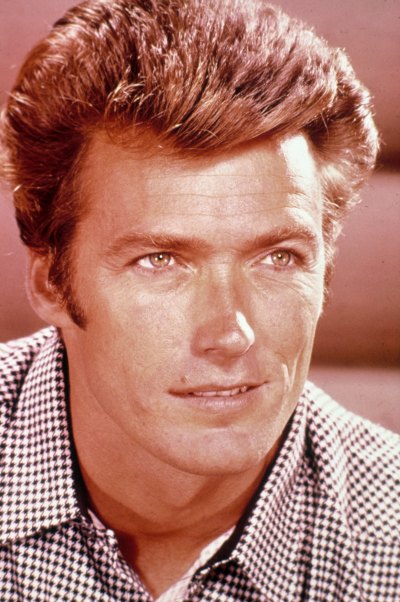When you think of career longevity in Hollywood, maybe you look at someone like Tom Cruise and are impressed by the fact he’s been a viable movie star since 1983’s Risky Business and is still going strong nearly 40 years later. But sitting in a class by himself is Clint Eastwood who continues to act and direct in a career spanning more than six decades, much of that success having to do with the fact that he struck out for independence early on in a gamble that paid off in a major way.
Biographer Marc Eliot, who wrote American Rebel: The Life of Clint Eastwood, reflects, “I’ve always written about people who either are not in the mainstream or choose to take themselves out of the mainstream, like Steve McQueen or Jack Nicholson. Clint had a vision for himself early on. When he left his TV series Rawhide [currently airing on the MeTV Network], he had no interest in staying in Hollywood. He didn’t like Hollywood, the studio system, the people in charge or the scripts he was getting.”

Snap/Shutterstock
In response, he decided to take the money he’d earned from the “Man with No Name” trilogy (more on that later) and put it into the creation of his own company, Malpaso Productions, which he ultimately decided would be closely controlled in regards to films in terms of shooting schedules and budget. This arose at least partially from what he felt was excessive spending and wasted time on productions like the World War II adventure Where Eagles Dare (1968) and the musical(!) Paint Your Wagon (1969).
“Those were not the kind of films he wanted to do,” explains Marc. “So he left Hollywood physically and symbolically armed with Malpaso, in effect a mini-studio, and really set the standard for guys like George Lucas who did a similar thing. You know, made it in Hollywood and then left Hollywood to create his own mini-studio, although Lucas was able to call all of his own shots. Whereas Steven Spielberg, even though he formed Dreamworks, is very much a Hollywood director. There’s no getting around that and I think Spielberg always wanted to be a mainstream Hollywood director. That’s not the same about Lucas or, especially, Clint Eastwood. So Clint was able to leave the system, for lack of a better term, and started to call the shots on his own and make the films that he wanted to make.”

Moviestore/Shutterstock
As to his career longevity as an actor, Michael Smith, a professor of film studies and author of Flickering Empire: How Chicago Invented the U.S. Film Industry, points to Clint’s most recent acting role in 2018’s The Mule: “He was 88 when the film was released. That movie made nearly $200 million at the box office, which is crazy. But the thing he’s been exceptionally good at is finding roles that are appropriate for himself as he’s aged. I also don’t think you can talk about him as an actor without talking about him as a director, because what he’s always done when he’s directed himself is to interrogate the Clint Eastwood persona. Right from the very first film he directed, Play Misty for Me, he was asking, ‘Who is Clint Eastwood, movie star? What does this persona mean?’ And he’s oftentimes undermined it; subtly playing against type.”
“And as he’s gotten older,” he continues, “what’s really interesting is he’s found star vehicles that are appropriate for his age. Gran Torino, which came out in 2009, was a great example of him playing a character who was not dissimilar from Dirty Harry and the kind of characters he played in the 1970s, where he’s a war veteran, a badass. But at the same time, he’s past retirement age and yet it’s still convincing. There’s a scene where he punches a gang-banger in the face and you still believe he’s tough enough to be that guy. But in The Mule, which came out last year, he can no longer do that. He is physically frail; his posture is hunched over and yet he was still able to find a starring role that was appropriate for what he is now.”
For much more on Clint Eastwood, please scroll down.

Moviestore/Shutterstock
Early Clint
Clinton Eastwood Jr. was born on May 31, 1930, in San Francisco, California, nicknamed Samson by the hospital due to the fact that he came into the world weighing in at 11 pounds and 6 ounces. Stability wasn’t easily found in his youth as his family was constantly on the move as his father looked for work all along the West Coast. Says Sara Anson Vaux, author of Clint Eastwood: A Biography and The Ethical Vision of Clint Eastwood, “Sometimes when the family was traveling, they’d stop at Eastwood’s grandmother’s house. She had a victrola and an extensive collection of records. They would play those and dance; there’s a scene in A Perfect World that seems to recreate that moment when he would step into grandmother’s house and the music begins. That was about 10 years of his life; when they finally settled, he was about 15, which is when he played jazz piano in a bar. He’d taught himself to play piano.”

Snap/Shutterstock
“Before he became an actor,” details Marc Eliot, “he was kind of a juvenile delinquent, I guess you could say. He played jazz piano and would pick up gigs in bars when he was in his late teens and early 20s. And if someone said the wrong thing to him, he flattened them. He had a very short fuse, which he still does, I think.”

Snap/Shutterstock
In 1951 he was drafted into the U.S. Army to serve in the Korean War. When he was stationed at Fort Ord he was spotted by someone at Universal and was eventually brought to the studio which, long story short, led to him being signed under contract for $100 a week. His early roles ranged from an uncredited part in Revenge of the Creature (1955) to films like Francis in the Navy (a predecessor for TV’s Mister Ed, only in this case it’s a talking mule rather than a talking horse) and Escapade in Japan (1957). In 1959, he got his big break when he was cast in the television series Rawhide. Running until 1965, the setting is the 1860s and Clint plays Rowdy Yates, one of the people in charge of moving stock of cattle over long distances.

AP/Shutterstock
‘Rawhide’ (1959-1965)
David R. Greenland, author of the book Rawhide: A History of Television’s Longest Cattle Drive, explains, “The show had the benefit of being launched at a time when Westerns were the dominant form of entertainment on television. It’s creator and first producer, Charles Marquis Warren, was an old pro of the genre and assembled a large and diverse cast that came off as more authentic than the typical Hollywood cowboy. While Rawhide was never the huge hit that Gunsmoke, Bonanza or Wagon Train were, six of its eight seasons were always consistently well done and highly entertaining.”

Moviestore/Shutterstock
“At first Eastwood’s portrayal of Rowdy Yates seemed to be above the status of tenderfoot, but not quite seasoned enough to be a top hand ready to take over as full-time trail boss,” he continues. “Eastwood himself referred to Rowdy as ‘idiot of the plains.’ By the time his character did indeed become trail boss in the final season, Yates had lost a lot of his youthful charm, smiling a lot less and coming off as downright fatalistic. This could very well have been due to the fact that he had just finished portraying the surly Man with No Name for the first time, in addition to the fact that he would have preferred leaving the series and having Eric Fleming continue as the lead.”

Jolly/Constantin/Ocean/Kobal/Shutterstock
‘A Fistful of Dollars’ (1964)
During his eight years on Rawhide, Clint was ready to make the leap to the big screen but not, as it turned out, in America. Instead, he went to Spain to shoot this “Spaghetti Western,” playing a character who would be dubbed in America The Man with No Name. In this first entry, he’s a wandering gunfighter who pits a pair of violent families against each other in director Sergio Leone’s take on the Western. Details David R. Greenland, “Rawhide was on hiatus between the sixth and seventh seasons when Eastwood went to Spain to shoot A Fistful of Dollars, along with his friend and fellow Rawhide castmate William Thompkins (who played Toothless in nine episodes) in 1964. In those days, television series usually shut down production from sometime in the spring to late summer, though different shows had different schedules depending on the amount of location filming to be done and the number of episodes being produced.”

Moviestore/Shutterstock
Points out Marc Eliot, “The first two of these films were made in the early ’60s while he was still with Rawhide. They couldn’t get an American actor to make these movies; they went through a long list of people … Paul Newman turned them down. So did a whole bunch of people. They didn’t want to do them, because they didn’t want to go to Spain and Italy and be bothered with that ‘junk’ that they thought nobody would see. So Clint did it and got $15,000 and a Cadillac or something. Some crazy deal like that. And that was the reason they have no dialogue, but it was also responsible for that whole image of the soft-spoken man of few words with lots of action, because they were aimed for an international audience. As a result, they didn’t want to have a lot of language problems with dubbing, subtitles and all that.”

Snap/Shutterstock
‘For a Few Dollars More’ (1965)
This time the Man with No Name is a bounty hunter who teams up with another of his kind (played by Lee Van Cleef) to take down the villain of the piece (played by Gian Maria Volonté). Notes Michael Smith, “The Man with No Name was his initial movie star persona and, in some ways, it was similar to the kind of male movie star persona that had been popular in Hollywood in the ’40s and ’50s. You know, the distraught, silent type, not unlike Gary Cooper, but because he was making these films in Italy they were far more violent and he was playing a much more morally ambiguous character. He does things in those movies that you wouldn’t quite expect a traditional Hollywood hero to do.”

P E A/Kobal/Shutterstock
‘The Good, the Bad and the Ugly’ (1966)
This time there are three gunslingers (Clint, Lee Van Cleef and Eli Wallach) competing against each other to find a hidden buried cache of Confederate gold during the chaos of the Civil War. All three Man with No Name films were released in America in 1967 and were a sensation, elevating Clint’s popularity here and setting him on the road he still travels on.

P E A/Kobal/Shutterstock
“Before that,” details Marc Eliot, “they couldn’t get distribution in America. It wasn’t until the new team took over at United Artists and they saw how popular these films were. This was in ’67 and they needed content for their new company, so they made a deal. They got the first two films for free and financed the third. That was the deal. They released The Good, the Bad and the Ugly internationally, then they brought the films here. And they were a sensation; people just went crazy and those three films made Clint Eastwood’s film career. They were moneymakers, they made him an international star, which had enormous appeal for Hollywood because, as you can see today, what was beginning to be understood back then was that you could break even here, but you could make all your profit overseas if you had the right kind of distribution and the right kind of film. So those three films changed the way Hollywood thought after the studio system had just about crumbled. It was a brand new ballgame, and internationalism was a bigger part of the game than ever before. Clint was instrumental in creating internationalism as a market for American films. And those three films, because they were released so close together here, made him a huge star in America. It was like having the James Bond films Dr. No, From Russia With Love and Goldfinger out in one year.”

De Laurentiis/Kobal/Shutterstock
‘The Witches’ (1967)
An Italian film consisting of five vignettes, all containing elements of witches and witchcraft. Clint appears in the final one, “An Evening Like the Others,” as a husband who, in an attempt to excite his wife, dresses up as a gunslinger, but she remains unimpressed.

United Artists/Kobal/Shutterstock
‘Hang ‘Em High’ (1968)
Clint’s first attempt to do a Western film in America. In it he plays Jed Cooper, an innocent man targeted for a lynching. Surviving, he sets out for revenge, though not before the local judge makes him a U.S. Marshall. Also starring Inger Stevens, Ed Begley and Pat Hingle.

Moviestore/Shutterstock
‘Coogan’s Bluff’ (1968)
This film allowed Clint to collaborate for the first time with director Don Siegel, whose credits at that point included the 1950s sci-fi classic Invasion of the Body Snatchers and who would not only become a mentor to Clint but a friend. The plot has to do with an Arizona deputy sheriff who has to travel to Manhattan to extradite a fugitive wanted for murder. In many ways it’s a transitional film in that elements feel like a Western transplanted to a modern setting. “Part of the reason Clint wanted to work with Don was to learn from him,” says Marc Eliot. “Not so much about acting — they would clash over a lot of acting elements — but in terms of how to make a movie. It was a big turning point for Clint.”
At the same time, adds Joe Street, author of Dirty Harry’s America: Clint Eastwood, Harry Callahan and the Conservative Backlash, “He plays the Man with No Name in different circumstances throughout Eastwood’s career. What he essentially does with Dirty Harry is move the Western into an urban setting, and you can see in the transitional movie Coogan’s Bluff he quite literally moves a cowboy character into the city, but does exactly the same things that are a normal cowboy movie would do. So instead of a horse chase, you have a motorcycle chase. Instead of the bordello, he goes to a regular bar and then to a nightclub. So you can see him in that movie almost start to lay the groundwork for Dirty Harry.”

Moviestore/Shutterstock
‘Where Eagles Dare’ (1968)
During World War II, Clint and Richard Burton lead a team of allied soldiers to launch a raid against the Nazis who are holding an American brigadier general in a castle, though there is more than meets the eye going on.

Paramount/Kobal/Shutterstock
‘Paint Your Wagon’ (1969)
Would you ever consider casting Clint and Lee Marvin in a musical about prospectors during the California gold rush sharing the same wife? Nope, neither would we, but back in 1969 somebody must have thought it was a good idea.

Universal/Kobal/Shutterstock
‘Two Mules for Sister Sara’ (1970)
During the reign of Emperor Maximilian in Mexico, Clint is an American mercenary who finds himself involved with a nun (Shirley MacLane) and a group of rebels. His second collaboration with director Don Siegel. Comments Joe Street, “Sergio Leone was notorious for taking an awful lot of time with the shooting schedule, reshooting again and again and asking for multiple takes. This aggravated Eastwood considerably. It’s notable that he starts working with Don Siegel, who is renowned for working very quickly, often with single takes. And, of course, that’s the key influence on Eastwood directorially, where he usually does one take and if you can’t get it done in that time, he has no use for you.”

Moviestore/Shutterstock
‘Kelly’s Heroes’ (1970)
World War II comedy adventure about a group of American soldiers who decide to go AWOL in order to rob a bank located behind enemy lines. Also starring Donald Sutherland, Telly Savalas, Don Rickles and Carroll O’Connor in his pre-All in the Family days.

Snap Stills/Shutterstock
‘The Beguiled’ (1971)
The trifecta for Clint and Don Siegel. During the Civil War, wounded Union soldier John McBurney finds himself imprisoned in a Confederate girls’ boarding school, where he cons his way into the hearts of the ladies and tries turning them against each other in a vie for freedom.

Moviestore/Shutterstock
‘Dirty Harry’ (1971)
Both Don Siegel and Clint are at the top of their game in this introduction for the character of Harry Callahan, a San Francisco detective whose rule-breaking, unorthodox approach goes up against a sniper named Scorpio (Andrew Robinson). It’s a commentary on the violence sweeping across America at the time, and very much a Western in modern garb, Clint’s six-shooter replaced by a .357 Magnum. “At the end, there’s a big shootout and Harry throws his badge into the lake. I mean, that’s right out of High Noon with Gary Cooper taking his badge off and throwing it on the ground as a way of rejecting the authority that has not aided him when he needed them to,” says Marc Eliot. “In Dirty Harry, they let the psychotic criminal out on a technicality, and Harry is disgusted because his sense of justice is Old West justice.”

Warner Bros/Kobal/Shutterstock
“Harry overlooks due process,” points out Joe Street, “and all the legal constraints that are placed on police work to take the law into his own hands. One of the frustrations that a lot of people, certainly Eastwood himself, felt about the way American law was progressing in the late ’60s and early ’70s, with the Miranda decision and things like that that were preventing police officers from doing that sort of thing. But Callahan doesn’t care about those sorts of things. He comes up with a quip, he blows somebody away and we remember the quip rather than the miscarriage of justice.”

Universal/Kobal/Shutterstock
‘Play Misty for Me’ (1971)
This one got there before Fatal Attraction! Making his directorial debut, Clint is radio disc jockey Dave Garver, who gives one of his female listeners (a genuinely creepy Jessica Walter) the wrong idea and when her feelings of love aren’t returned, she goes psychotic.

Universal/Kobal/Shutterstock
‘Joe Kidd’ (1972)
Not getting too far from his Western roots, Clint is the title character, an ex-bounty hunter hired by Frank Harlan (Robert Duvall), a wealthy landowner, who wants him to find revolutionary leader Luis Chama (John Saxon), who fights for land reform — which Harlan wants stopped.

Moviestore/Shutterstock
‘High Plains Drifter’ (1973)
Showing directorial influences from both Don Siegel and Sergio Leone, Clint casts himself as The Stranger, a man (with no name, apparently) who is hired by the people of the settlement Lago to fight back against a trio of outlaws who are heading their way. Says Marc Eliot, “Even on Rawhide he tried to direct, but what was interesting about it is that those union guys when he would say, ‘Look, I want to put the camera over here,’ they would say, ‘No, you don’t do it that way. You leave the camera here and then you cut on this line.’ So basically he couldn’t really do it. They wouldn’t let him actually direct. So directing High Plains Drifter, again, he was more comfortable in Westerns, because there was’t a lot of dialogue, but there was a lot of action, which he was very good at.”
Adds Sara Anson Vaux, “What was contrasting here from The Man with No Name is that when his character is essentially given the keys to the town to have the freedom to wipe out the evildoers that are coming, he goes into a shop to buy some goods and sees the shopkeeper berating an older Native American man and his grandson for looking at blankets. But then Eastwood piles the guy with blankets and gives the grandson lots of candy and offers some healing words to them before putting it on his bill. Just kind of a mini-lecture in mercy that’s right out of Rawhide.”

Columbia/Warner/Kobal/Shutterstock
‘Magnum Force’ (1973)
Harry’s back and so is Hang ‘Em High director Ted Post. This time Harry goes up against a team of vigilante cops whose idea of justice is to murder those who escape it from the courts. Among the actors playing the cops is pre-Starsky and Hutch star David Soul. Speaking of the appeal of the Dirty Harry character, Joe Street muses, “He does things that we can’t do. Not in the Superman way of leaping tall buildings, but he comes up with quips far quicker than you or I and when he’s really irritated with somebody, he can pull out his Magnum and blow them away. And that’s the thing that we’ve often imagined ourselves doing, but couldn’t ever do. So in that sense he’s kind of freed of the constraints that are placed around us by society and by ourselves. He’s a great escapist figure.”

Columbia/Warner/Kobal/Shutterstock
Joe continues, “It’s kind of interesting that in the first film Siegel saw Harry as a contribution to the discussion over violence in cinema at the time in the wake of The Wild Bunch, Bonnie and Clyde and films like that. The second film is sort of an overlong police procedural and it kind of reverses the polarity of the first film in ostensibly saying, ‘If you think Dirty Harry’s a Nazi, here’s some real Nazis we’ll juxtapose him with.’”

United Artists/Kobal/Shutterstock
‘Thunderbolt and Lightfoot’ (1974)
The title characters are played respectively by Clint and Jeff Bridges. Clint’s a bank robber who brings his old gang back together — with the addition of Jeff’s young sidekick character — to pull off the biggest height of their career.

Universal/Kobal/Shutterstock
‘The Eiger Sanction’ (1975)
Imagine a really dark pre-version of Indiana Jones and you might have Jonathan Hemlock (Clint), a classical art professor and collector who also happens to be a professional assassin. He’s hired to come out of retirement to avenge the killing of an old friend. George Kennedy co-stars.

Moviestore/Shutterstock
‘The Outlaw Josey Wales’ (1976)
When Missouri farmer Josey Wales joins a Confederate underground fighting unit, he finds himself actually on the run when his family is murdered by Union soldiers. We thinks Clint will ultimately stop running and do his thing.

Warner Bros/Kobal/Shutterstock
‘The Enforcer’ (1976)
It’s another Dirty Harry flick. Harry Callahan, who has teamed up with Inspector Kate Moore (Tyne Daly), is tasked with stopping a terrorist organization consisting of angry Vietnam veterans. Probably the worst in the series.

Moviestore/Shutterstock
‘The Gauntlet’ (1977)
Ben Shockley is the cop who must get a prostitute (Sondra Locke), who is witness to mob crimes, from Las Vegas to Phoenix — with a whole lotta people out to stop them by any means necessary. Some really incredible action and gun battles in this one.

Warner Bros/Kobal/Shutterstock
‘Every Which Way But Loose’ (1978)
One of Clint’s most comedic efforts up until that time sees him as truck driver and street fighter Philo Beddoe, accompanied by his brother Orville and an orangutan named Clyde, who is trying to find a lost love — which doesn’t prevent him from developing feelings for a country singer (Sondra Locke) he encounters. Reflects Michael Smith, “I’m sure there were a lot of people at the time who thought that starring in a movie with an orangutan would be a bad idea for somebody with a macho persona. It goes to show how smart his commercial instincts are to star in a comedy like that — and which ended up being the highest-grossing film of his career and spawned a sequel.”

Moviestore/Shutterstock
‘Escape from Alcatraz’ (1979)
The final collaboration between Clint and director Don Siegel. Frank Morris (Clint) is one of three men attempting to escape from the most infamous prison in the world. Great back and forth between Frank and the warden, played by Patrick McGoohan.

Moviestore/Shutterstock
‘Bronco Billy’ (1980)
With interest dropping in modern Wild West shows, cowboy Billy Bronco (Clint) is desperate to keep the show alive, sometimes to comic results. States Michael Smith, “When Clint kept going back to Dirty Harry, he knew those movies were going to make a lot of money, so at the same time that he was churning out these films, he was also starring in films that he was producing and directing that were far more personal, that were smaller films that he knew were not going to make a lot of money. That speaks to his shrewdness as a filmmaker and ultimately as a business person. I’m talking about movies like Bronco Billy and Honkytonk Man, which are two of his very best films. He’s done a really exceptional job of balancing bigger, more commercial projects and smaller, more artistic projects.”

Warner Bros/Kobal/Shutterstock
‘Any Which Way You Can’ (1980)
Not every movie needs a sequel, as proven by this sequel to Every Which Way But Loose. Things get sillier as Clint’s Philo Beddoe, his brother Orville, orangutan Clyde and country singer Lynn Halsey-Taylor (Sondra Locke) get involved with the mob, motorcycle gangs and corrupt cops.

‘Firefox’ (1982)
Military pilot Mitchell Gant (privately suffering from a case of PTSD) is assigned to sneak into the Soviet Union in an effort to steal a prototype fighter jet that is partially operated through a neural link.

Moviestore/Shutterstock
‘Honkytonk Man’ (1982)
Country singer Red Stovall (Clint), who is suffering from tuberculosis, has an opportunity to perform at the Grand Ole Opry, so he sets off to do so accompanied by his nephew (played by Clint’s son, Kyle).

Warner/Malpaso/Kobal/Shutterstock
‘Sudden Impact’ (1983)
The fourth Dirty Harry film, with Harry conflicted in tracking down a woman (Sondra Locke), who is murdering the men responsible for raping her years earlier. A really strong entry in the series that gave us the immortal Clint line, “Go ahead. Make my day.” Comments Joe Street, “This is a really underrated movie. It gets bad press, I feel, because the two preceding Dirty Harry movies frankly weren’t very good. The people didn’t really respond very well to this. The ‘avenging angel’ in there some people said was some sort of ‘Dirty Harriet,’ which wasn’t quite right in itself. What was interesting to me is that it was the only one directed by Clint Eastwood and he brought back Bruce Surtees as the cinematographer. As a result, the cinematography and direction of it are actually really interesting. Much more so than the writing. It actually deserves comparisons to other movies of the time that he directed rather than the other Dirty Harry movies.”

Warner/Malpaso/Kobal/Shutterstock
‘Tightrope’ (1984)
A genuine psychological thriller with Clint as New Orleans cop and single dad Wes Block, whose hunt for a serial rapist turns this particular game of cat-and-mouse on its head and Wes suddenly finds himself being the one pursued. Written and directed by Richard Tuggle. “His character questions his own sexuality in this one in a really interesting way,” says Michael Smith. “I think Tightrope is maybe where Dirty Harry should have been, but it was just a little too off the beaten path to feature that character.”

Warner Bros/Kobal/Shutterstock
‘City Heat’ (1984)
Take two of the biggest stars in the world — in this case Clint and Burt Reynolds — cast them as a cop and private investigator on a murder case in 1933 Kansas City, and what do you get? A mess. “It’s one of the worst movies he’s ever made,” Michael Smith states matter-of-factly. “I loved it as a kid, because I had already seen the orangutan movies and was a fan of Burt Reynolds’ The Cannonball Run. But I was a kid. In reality, it was meant to be a lighthearted buddy comedy where these two macho icons were kind of sending up their personas, but it was a lazy piece of filmmaking. I think that was one where he was offered a script and sort of agreed to it, even though it’s one of his most forgettable films.”

Warner Bros/Kobal/Shutterstock
‘Pale Rider’ (1985)
Back in the comfort of of the Old West, Clint is a preacher with a mysterious past who is determined to protector a prospector village from a mining company intent on coming in and taking over their land.

Snap Stills/Shutterstock
‘Heartbreak Ridge’ (1986)
Taking command of an awful recon platoon, Marine Gunnery Sergeant Tom Highway (Clint) has to whip them into shape before they have to ship out while at the same time dealing with his superiors and his ex-wife.

Moviestore/Shutterstock
‘The Dead Pool’ (1988)
And it all comes to an end here in the fifth and final Dirty Harry film. This time Harry is investigating the murders of celebrities and finds himself on the list. Just to demonstrate how things have changed during these five films, Harry started off dispatching bad guys with a .357 Magnum and concludes him using a harpoon gun.

Warner Bros/Kobal/Shutterstock
Opines Marc Eliot, “I think he lost interest in the character. After a while when you’re doing these sequels, the rule is half the money, half as good. That tends to be true with exceptions. At the same time, when you have your own production company with payroll and all, sometimes you make a movie that pays the bills and you have a film you know will make money … Look at a film like the original Death Wish, which was mildly interesting. I never found it to be a very good movie, but again, mildly interesting. And then when you get to the 20th one or whatever, you’re scraping the bottom of the barrel. You know, how many wives does this guy have that can get killed? This is going to be a strange analogy, but with something like the Dirty Harry films, it’s like you take a shot of heroin. Then you need two shots to make up for the one shot and it goes on from there. That’s what happens with these films. Audiences want more, even though they think they’re getting it, but they’re getting the same stuff and the actor is losing interest.”

Moviestore/Shutterstock
‘Pink Cadillac’ (1989)
Bernadette Peters co-stars with Clint in this action comedy about a woman and her husband driving a valuable pink Cadillac as they try to escape from a white supremacists and a bounty hunter who want the money hidden in the vehicle.
Moviestore/Shutterstock

‘White Hunter, Black Heart’ (1990)
John Wilson (Clint) is a thinly-disguised version of director John Houston and an adventure that reportedly took place during the filming of the 1951 film The African Queen — which itself starred Humphrey Bogart and Katharine Hepburn.

Warner Bros/Kobal/Shutterstock
‘The Rookie’ (1990)
Charlie Sheen is rookie cop David Ackerman who finds himself teamed with veteran cop Nick Pulovski (Clint), and together they have to stop a German criminal. This buddy-cop film wants to be Lethal Weapon. It’s not.

Moviestore/Shutterstock
‘Unforgiven’ (1992)
An Old West gunslinger named William Munny (Clint) comes out of retirement for one more job, which sees him going up against Gene Hackman‘s Little Bill Daggett. Also starring Morgan Freeman as Ned Logan, William’s partner. Clint’s most greatest and most nuanced Western, which went on to with the Academy Award for Best Picture, Best Director (for Clint), Best Supporting Actor for Gene and Best Editing. Suggests Marc Eliot, “You can look at Unforgiven as The Man with No Name 30 years later. I mean, that same character who has lived that life and has gone on to open a grocery store, but has to do one final battle. Essentially it’s the end of the Western and that character.”

Snap/Shutterstock
‘In the Line of Fire’ (1993)
Still living with the guilt of not saving President Kennedy, Secret Service agent Frank Horrigan (Clint) is determined to keep the current commander-in-chief safe from an assassin intent on killing him.

Moviestore/Shutterstock
‘A Perfect World’ (1993)
Kevin Costner is escaped convict Butch Haynes, who kidnaps a young boy he actually strikes up a friendship with. Texas Ranger “Red” Garrett (Clint) is trying to chase him down.

Ken Regan/Amblin/Malpaso/Kobal/Shutterstock
‘The Bridges of Madison County’ (1995)
Based on the bestselling novel and set in the 1960s, Clint is photographer Robert Kincaid, who find himself in a four-day affair with housewife Francesca Johnson (Meryl Streep). Comments Marc Eliot, “After Play Misty for Me, he began an active shift in his career where he wanted to be accepted more by the general public, and he made choices aimed in that direction. But the problem with Clint Eastwood not attaining that at the level that he wanted was that even though he was a good-looking guy, and a very manly man, had all the attributes of the reluctant hero, soft-spoken tough and all of that, he was never a ladies man on screen. It would be very difficult to come up with a film that Clint Eastwood made that was a love story.

Moviestore/Shutterstock
“Even The Bridges of Madison County, which is probably the closest you can get to that type of film,” he continues, “it’s a film where he leaves at the end. He leaves her alone, saddened and missing him and all of that. But other than that, Clint is one of those, ‘I’d rather be with the boys-type of actors, and more than anything that’s the reason he wasn’t considered on the same level as, say, a Brad Pitt or even a Burt Reynolds, who made a lot of romantic movies along with a lot of action films. I just don’t think he was interested in being a romantic figure though, as I said, he could have been.”

Moviestore/Shutterstock
‘Absolute Power’ (1997)
A political thriller that puts thief Luther Whitney (Clint) up against the President of the United States (Gene Hackman) when he witnesses the president’s secret service agents murdering a woman on his behalf.

Moviestore/Shutterstock
‘True Crime’ (1999)
Journalist Steve Everett (Clint) attempts to obtain the evidence that will prove the innocence of a man on death row and sentenced for execution.

Ken Regan/Warner Bros/Roadshow/Kobal/Shutterstock
‘Space Cowboys’ (2000)
Retired NASA engineer Frank Corvin (Clint) is asked to lead a mission into space to save a failing satellite, but to do so he insists on his old team, played by Tommy Lee Jones, James Garner and Donald Sutherland.

Moviestore/Shutterstock
‘Blood Work’ (2002)
A retired F.B.I. profiler (Clint), still recovering from a heart transplant, has to return to service to uncover the identity of a serial killer — who might be closer than he thinks.

Moviestore/Shutterstock
‘Million Dollar Baby’ (2004)
Boxing trainer Frankie Dunn (Clint) reluctantly agrees to help train female boxer Maggie Fitzgerald (Hilary Swank) with potential. Things take an unexpected turn, though — Rocky this ain’t.

Snap Stills/Shutterstock
‘Gran Torino’ (2006)
When young neighbor Thao Lor (Bee Vang), a Hmong teenager, attempts to steal Korean War veteran Walt Kowalski’s 1972 Gran Torino, he decides to rehabilitate the kid — despite the threat of a local gang who is symbolically vying for Thao’s soul. “You can look at Clint’s character in this one as Dirty Harry as an old man; a retired detective living alone who has to deal with this gang of kids. That gang of kids is like the gang in A Fistful or Dollars or For a Few Dollars More. It’s the same thing. That’s where Clint was comfortable. That’s why I said he didn’t want to make romantic movies, because they were too contemporary,” says Marc Eliot. “They were not the kind of characters that he wanted to play. His interest was being with the boys. If you look at Dirty Harry, The Man with No Name, Unforgiven, Gran Torino, Million Dollar Baby — they’re all about being with the boys there. There’s no romantic figure in these films. With Play Misty for Me, you see what happens when you have a one-night stand: it becomes Vietnam. And that’s really the undercurrent of that film, it’s Vietnam and a one-night stand that never ended. You look at his relationships, the kids he had in and out of wedlock, and you can see that he couldn’t draw upon anything in his life that was associated with romance. Most of it was bitter, a big lawsuit with Sondra Locke, and divorce.”

‘Trouble with the Curve’ (2012)
Amy Adams plays a woman attempting to repair the relationship between her and her baseball scout father, Gus, who’s seriously ill, by accompanying him on what could be his final recruiting trip.

Warner Bros/Kobal/Shutterstock
‘The Mule’ (2018)
In what’s an unexpected turn, Clint plays 90-year-old Earl Stone, a Korean War vet and horticulturist who becomes a drug mule for a Mexican cartel. “It’s a really fun movie,” opines Michael Smith. “There’s a lot of comedy in it and a lot of the best scenes in the film are him driving in a truck and singing along to the radio. And the way those sequences are shot, the camera is far enough away from the truck that you can tell he’s actually driving. In a way, he was kind of showing off, saying, ‘Look, I can still drive a large pickup truck. I may not be able to ride a horse anymore, but I can still do this.’”

Eric Charbonneau/Shutterstock
Films Directed By — But Not Starring — Clint Eastwood
Bird (1988), Midnight in the Garden of Good and Evil (1997), Mystic River (2003), Flags of Our Fathers (2006), Letters from Iwo Jima (2006), Changeling (2008), Invictus (2009), Hereafter (2010), J. Edgar (2011), Jersey Boys (2014), American Sniper (2014), Sully (2016), The 15:17 t0 Paris (2018) and Richard Jewell (2019).
“Everybody told him that this film, Richard Jewell, would bomb,” says Marc Eliot. “Everybody told him, but Clint didn’t care. I mean, that’s how big he is. And Warner Bros would never not distribute that film, because he’s too valuable a commodity. But in the film you can see all the elements that appeal to Eastwood: someone who is given a bum steer, someone who was outside the mainstream and someone who had to fight to get his recognition and justice. These are all elements that appealed to Clint. But what makes this film different is that there is no star to speak of. There’s no Tom Hanks, which is the reason that a film like Sully was a hit and why this film is a disaster. He’s almost 90 years old and certainly can’t be Dirty Harry anymore, but he still wants to make movies. So he looks for these stories that he thinks will have a broad appeal. A lot of it missed, because nobody even remembers that Olympics thing. That was such a blurry, crazy story and people have more important things on their mind today than back then. But for Clint, living in the past is kind of an important thing for him, because the future is a little bit dark.

Jordan Strauss/Invision/AP/Shutterstock
“At the same time,” he adds, “he’s unique in so many ways. How many actors or directors, in this country anyway, are working when they’re approaching 90 who studios will still hire? Who’s going to hire a 90-year-old director to direct a film aimed at 20 year olds? It doesn’t make any financial or creative sense, but if you go to France, those guys are still working when they’re 100. And they’re applauded for it. It’s just a different world. Hollywood is like the 10th planet, just existing in its own orbit. But then there’s Clint Eastwood…”

AP/Shutterstock
The Legacy of Clint Eastwood
In a career that has spanned 65 years, it’s obvious that Clint Eastwood is a Hollywood icon whose legacy will be felt by generations to come. “When I think of him, the first word that comes to mind is integrity,” says Michael Smith. “He has a lot of integrity as a filmmaker and as an actor. Throughout his career, time and time again he challenged himself when he could have done the easy thing. He could have just made films like City Heat over and over again, but instead he really stretched himself. We’ve talked about Bronco Billy and Honkytonk Man, but look at something like The Bridges of Madison County. He took a big risk playing that role. It’s a romantic melodrama and for him, in his 60s, to say, ‘I want to play the leading role in a melodrama opposite the greatest actress in the world’ … That was something people were very unsure of on paper; it didn’t sound right. And then the film came out and it was a huge success critically and commercially. He’s made those kinds of choices throughout his career, and while there are other filmmakers and actors who do have that integrity, I don’t they’ve been at the level of stardom that Clint Eastwood has been.”
News
Kim Kardashian, 43, poses with mini-me daughter Chicago West, six, in new photos from the little girl’s Bratz birthday bash
Kim Kardashian made her mini-me daughter Chicago West’s sixth birthday one to remember by throwing an extravagant party last month. And on Thursday, the SKIMS founder, 43, shared new photos from…
Love Island: All Stars SPOILER: A recoupling rocks the villa as Casey and Joanna are given first choice of partners… leaving one girl devastated
Another recoupling rocks the Love Island villa on Thursday night as the boys are tasked with choosing their favourite girl. The All Stars are left reeling as…
Casey O’Gorman leaves Love Island All Stars viewers speechless as he reveals he dumped ‘spiritual’ Georgia Harrison after she claimed to see the ghost of his dead grandad in BIZARRE chat
Casey O’Gorman left Love Island All Stars viewers speechless as he revealed why he dumped ‘spiritual’ Georgia Harrison on Thursday’s jam-packed episode. The recruitment consultant, 27, said…
Dancing On Ice fans are stunned as Holly Willoughby is forced to apologise for ‘dropping the F bomb’ on live TV as co-host Stephen Mulhern makes her jump
Dancing On Ice host Holly Willoughby apologised in case she accidentally said a ‘naughty word’ at the start of Sunday’s Dancing On Ice. After a few celebrities had performed, she…
ITV quiz show confirmed to return as host admits he is ‘over the moon’ after ratings success
Deal Or No Deal has been confirmed to return to ITV screens after host Stephen Mulhern admitted he was ‘over the moon’ at the show’s ratings success. The ITV quiz show…
Holly Willoughby and Phillip Schofield’s permanent replacements on This Morning ‘FINALLY revealed as new hosting duo get set to take over’
Holly Willoughby and Phillip Schofield’s permanent replacements on This Morning have finally been revealed, it has been reported. The presenters, 42 and 61, both left the ITV…
End of content
No more pages to load











